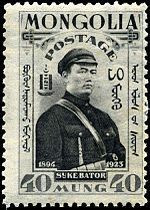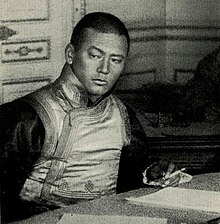Damdiny Süchbaatar
Damdiny Süchbaatar (born as Damdiny Süch , Mongolian Дамдины Сүхбаатар , mostly only Süchbaatar , also Süch , Suche-Bator ) (* February 2, 1893 ; † February 22, 1923 ) is considered a founding father of the Mongolian People's Republic .
Life

Süch ("ax" in Mongolian) was probably born in Urga (Örgöö, today Ulan Bator) and attended a Russian school there. The language skills he acquired were later useful. In 1911 he joined the army, but was soon forced to resign due to insubordination . He was destitute and unemployed until he was called up again in 1912 as one of the first recruits to the new Mongolian army. His skills earned him the rank of reserve sergeant.
After proving himself in border conflicts with the Republic of China , he was promoted to officer in the reserve. At this time he gained a reputation for leadership talent with the nickname Baatar (hero). After his release he joined a Soviet revolutionary group in autumn 1918, of which he became the leader. The following year, Süchbaatar united his group with a second, which Tschoibalsan had founded. Both groups fled the returning Chinese troops in 1920 and gathered with around 50 people in Siberia for further military training with the Red Army .
Meanwhile, the occupied White Army led by Roman von Ungern-Sternberg , the Outer Mongolia and called an independent monarchist Mongolian State from March 13, 1921st On the same day, with Soviet support, Süchbaatar and Tschoibalsan founded the Mongolian People's Revolutionary Party and a communist counter-government with Süchbaatar as Minister of War. Their troops of 400 men became the Mongolian People's Revolutionary Army , with Süchbaatar as commander in chief .
A little later, Süchbaatar marched with his 400-man army and with the support of over 10,000 Red Army soldiers into Outer Mongolia and occupied Urga within a short time. The Soviet Union then established the Mongolian People's Revolutionary Party as the ruling party, but left it temporarily with a constitutional monarchy. Süchbaatar died of an illness in 1923. Some contemporary witnesses (including Tschoibalsan) suspected that he had been poisoned.
The government of the Mongolian People's Republic, founded in 1924, posthumously declared Süchbaatar a hero. His widow Süchbaataryn Jandschmaa became President of the Mongolian People's Republic in 1953, making her the first woman to hold a presidency.
Web links
Individual evidence
- ^ Robert Arthur Rupen: Mongols of the Twentieth Century. Indiana University, 1964, p. 276.
- ↑ Eva-Maria Stolberg : Stalin and the Chinese Communists. A study of the history of the origins of the Soviet-Chinese alliance against the backdrop of the Cold War. Franz Steiner Verlag, 1997, p. 113.
- ↑ Achitsaikhan Battushig: Economic Transformation in Mongolia. Herbert Utz Verlag, 2000, p. 12.
| personal data | |
|---|---|
| SURNAME | Damdiny Süchbaatar |
| ALTERNATIVE NAMES | Addiction; Suche-Bator; Дамдин, Сүхбаатар (Mongolian); Damdin, Sühbaatar (English) |
| BRIEF DESCRIPTION | Mongolian revolutionary and national hero |
| DATE OF BIRTH | February 2, 1893 |
| PLACE OF BIRTH | uncertain: Urga (today Ulan Bator) , Mongolia |
| DATE OF DEATH | February 22, 1923 |
